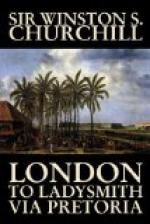But we were not prepared for the complete results that followed the operations of the 27th. Neither the General nor his army expected to enter Ladysmith without another action. Before us a smooth plain, apparently unobstructed, ran to the foot of Bulwana, but from this forbidding eminence a line of ridges and kopjes was drawn to the high hills of Doorn Kloof, and seemed to interpose another serious barrier. It was true that this last position was within range, or almost within range, of Sir George White’s guns, so that its defenders might be caught between two fires, but we knew, and thought the Boers knew, that the Ladysmith garrison was too feeble from want of food and other privations to count for very much. So Sir Redvers Buller, facing the least satisfactory assumption, determined to rest his army on the 28th, and attack Bulwana Hill on March 1.
He accordingly sent a message by heliograph into Ladysmith to say that he had beaten the enemy thoroughly, and was sending on his cavalry to reconnoitre. Ladysmith had informed herself, however, of the state of the game. Captain Tilney, from his balloon, observed all that passed in the enemy’s lines on the morning of the 28th. At first, when he heard no artillery fire, he was depressed, and feared lest the relieving army had retreated again. Then, as it became day, he was sure that this was not so, for the infantry in crowds were occupying the Boer position, and the mounted patrols pricked forward into the plain. Presently he saw the Boers rounding up their cattle and driving them off to the north. Next they caught and began to saddle their horses. The great white tilted waggons of the various laagers filed along the road around the eastern end of Bulwana. Lastly, up went a pair of shears over ‘Long Tom,’ and at this he descended to the earth with the good news that the enemy were off at last.
The garrison, however, had been mocked by false hopes before, and all steeled themselves to wait ‘at least another ten days.’
Meanwhile, since there was no fire from the enemy’s side, our cavalry and artillery were rapidly and safely crossing the river. There was a considerable block at the bridge when the South African Light Horse arrived, and we had full leisure to examine the traffic. Guns, men, horses, and mules were hurrying across to the northern bank, and an opposing stream of wounded flowed steadily back to the south. I watched these with interest.
First came a young officer riding a pony and smoking a cigarette, but very pale and with his left arm covered with bloody bandages. Brooke greeted him and asked, ‘Bone ?’ ‘Yes,’ replied the subaltern laconically, ‘shoulder smashed up.’ We expressed our sympathy. ’Oh, that’s all right; good show, wasn’t it? The men are awfully pleased;’ and he rode slowly on up the hill—the type of an unyielding race—and stoical besides; for wounds, especially shattered bones, grow painful after twelve or fourteen




